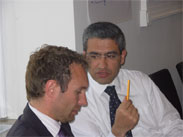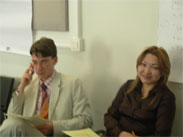Ted Feifer and Mike Lekson of the Education and Training Center/ International conducted the Institute's sixth workshop on negotiation skills in multilateral diplomacy for the Organization for Security and Cooperation in Europe (OSCE) in Vienna, May 14-16, 2008.
Ted Feifer and Mike Lekson of the Education and Training Center/ International conducted the Institute's sixth workshop on negotiation skills in multilateral diplomacy for the Organization for Security and Cooperation in Europe (OSCE) in Vienna, May 14-16, 2008. There were 25 participants. Half came from national delegations to the OSCE (Russia, Turkey, Montenegro, Slovenia, Ireland, Armenia, Germany, Norway, the U.S., and Belarus), and half were OSCE Secretariat staff members. These included 4 Kazakhstan Foreign Ministry officers posted to Vienna to gear up for their country's chairmanship of the OSCE in 2010.
Workshop objectives were to explore the similarities and differences between multilateral and bilateral negotiations; strengthen participants' analytical, problem solving, and negotiating skills; and increase their understanding of and ability to use the multilateral process to achieve their objectives.
The workshop focused on strengthening core negotiation skills in bilateral and multilateral situations. Participants engaged in a two-person negotiation exercise, utilized a problem solving framework to work through a typical OSCE mission challenge, did a self-assessment on their conflict management style and were briefed on using style as an analytic tool, and assessed the use of negotiation skills in emotional situations. They applied their skills and lessons learned in multiparty negotiations with an OSCE Permanent Council scenario, and in a complex simulation based on the management of the 1999 Horn of Africa conflict by the Organization of African Unity.

The workshop gave OSCE Secretariat staff and diplomats assigned to the OSCE the opportunity to work with and better understand each other's priorities and work. As one participant noted, the training was "most useful for professionals who have been involved in real-life negotiations." Another, "greener" participant, felt the workshop was very useful precisely because he had very little experience in negotiation skills. One participant seemed to sum of the view of many by noting the special value of the workshop in helping her to evaluate her regular work in light of the experience of the workshop.



